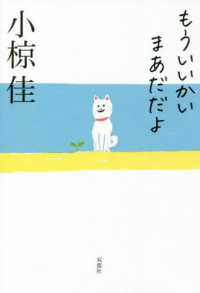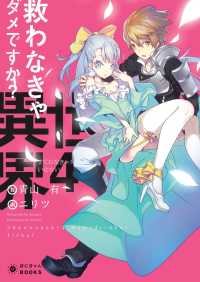- ホーム
- > 洋書
- > 英文書
- > Religion / Ethics
Full Description
The English Soul portrays the spirit and nature of English Christianity as it has developed over the last 1,400 years. As the predominant faith of the people, Christianity has been the reflection, perhaps the embodiment, of the English soul. This fascinating new history argues that Christianity has been the anchoring and defining doctrine of England, while accepting respectfully that other powerful and significant faiths have also influenced the religious sensibility of this nation.
Peter Ackroyd surveys the lives and faith of the most important figures of English Christianity, from the Venerable Bede to C. S. Lewis, exploring the mysticism of Julian of Norwich and William Blake, the tumultuous years of the Reformation, the emergence of the English Bible, the evangelical tradition, including John Wesley, and the contemporary contest between tradition, revival and atheism. This is an essential, comprehensive and accessible survey of English Christianity.
Contents
Author's Note
One: Religion as History: The Venerable Bede (673-735)
Two: Religion as Revelation: Julian of Norwich (1343-1416)
Three: Religion as Reform: John Wyclif (c. 1328-1384)
Four: Religion as Reformation: William Tyndale (1494-1536), Thomas Cranmer (1489-1556), John Foxe (1516-1587)
Five: Religion as Orthodoxy: Richard Hooker (1554-1600)
Six: Religion as Opposition: Thomas Cartwright (1535-1603), Robert Browne (c. 1550-1633), Henry Barrow (c. 1550-1593) 92
Seven: Religion as Sermon: Lancelot Andrewes (1555-1626), John Donne (1572-1631)
Eight: Religion as Scripture: The Authorized Version (1611)
Nine: Religion as Poetry: George Herbert (1593-1633)
Ten: Religion as Order: William Laud (1573-1645)
Eleven: Religion as Sect: Thomas Helwys (1575-1616) and the Baptists, John Lilburne (1615-1657) and the Levellers, Gerrard Winstanley (1609-1676) and the Diggers, Abiezer Coppe (1619-1672?) and the Ranters, Lodowicke Muggleton (1609-1698) and the Muggletonians
Twelve: Religion as Transformation: George Fox (1624-1691)
Thirteen: Religion as Experience: John Bunyan (1628-1688)
Fourteen: Religion as Revival: John Wesley (1703-1791)
Fifteen: Religion as Individual: William Blake (1757-1827)
Sixteen: Religion as Established
Seventeen: Religion as Battle: Catherine Booth (1829-1890), William Booth (1829-1912)
Eighteen: Religion as Thought: John Henry Newman (1801-1890)
Nineteen: Religion as Evangelical: Charles Spurgeon (1834-1892)
Twenty: Atheism as Religion: Charles Bradlaugh (1833-1891), Annie Besant (1847-1933), Richard Dawkins (1941-)
Twenty-One: Religion as Argument: G. K. Chesterton (1874-1936), C. S. Lewis (1898-1963)
Twenty-Two: Religion as Contemporary: Evangelicals, Pentecostalists, Charismatics
Twenty-Three: Religion as Theology: John A. T. Robinson (1919-1983), John Hick (1922-2012), Don Cupitt (1934-)
Further Reading
Acknowledgements
Photo Acknowledgements
Index








